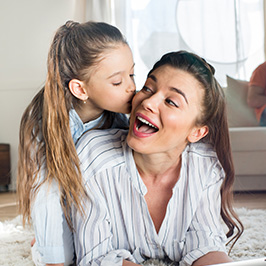ABA Parent/Caregiver Training is the process in which a trained professional such as a BCBA or BCaBA works with parents or caregivers to help them understand the functions of their child’s behaviors and modify the environment to be more successful. While the work of our RBTs can help improve the life of your child, this process must continue beyond the clinical setting. Thus, parents/caregivers meet with our therapists, who teach them how to use specific procedures to alter interactions with their child, promote socially appropriate behaviors, and reduce maladaptive behaviors.
Not doing so could potentially compromise or delay the process and make it harder to reach behavioral goals. Parent training will tell you why specific behaviors occur and how to respond to them effectively. Our goal is to educate you, parents and caregivers, to continue the progress at home and make a cohesive and involved growth experience. Furthermore, to provide everyone involved in raising your child the tools and strategies needed to see them thrive. We find that children progress more rapidly when parents and other family members are involved.
Understanding the fundamental principles of ABA is critical for the implementation of treatment. Participating in parent training allows caregivers to gain the tools and knowledge needed to carry out interventions recommended for their child. Parents/caregivers that are active participants in the treatment process will see greater results across all settings. It takes a village!
Naturalistic teaching is among the most widely utilized processes in ABA, and it is significantly reinforced through parent training. In a nutshell, it is a teaching that happens during everyday occurrences. In this form of interaction, your child initiates the teaching episodes which will lead you, parents, to insert naturalistic teaching into the situation. As an example, if your child shows interest in a butterfly, you could start by describing its attributes and actions involved (color, flying, wings, etc.).
Functional life skills are what we all need to lead our lives independently. These include toileting, feeding oneself, dressing oneself, and basic hygiene. Learning these skills builds self-esteem and confidence. Your child would often need explicit instruction with plenty of repetitions to obtain the same skills. Thus, it is your responsibility as a parent to teach them life skills so that your child can maximize his/her potential to participate in everyday life.
Understanding the ABCs of ABA is fundamental to help our children transition to more socially appropriate behaviors. The antecedent refers to what happens to prompt or cause the behavior. The targeted behavior is what is being analyzed in each scenario. The consequence is what happens because of the presented behavior. Interpreting this process gives us the information needed to identify the function of the behavior.
Reinforcement refers to the idea that behavior increases in frequency after the presentation or removal of a stimulus following that behavior. Meanwhile, punishment is the opposite of the former’s concept in which behavior is decreased by its implementation. Understanding these and implementing them adequately is critical for a child’s progress. The ABA model focuses mainly on the reinforcement of socially significant behaviors.
Functional communication is the most basic form of communication. It is how children spontaneously and independently communicate their wants and needs and socialize with others. This type of communication can happen in various ways, such as spoken words, gestures, signs, exchanging pictures, or utilizing augmentative and alternative devices (AAC).
We believe that well-established procedures result in a high-quality service. We invest the time
needed to gather the necessary information to produce the best plan of care for all the children we serve.
Our onboarding team will contact you to gather information and documents needed for ABA benefits verification and intake.
After the consultation, we will ask for authorization to carry out an initial assessment. A BCBA will then conduct the assessment upon getting an authorization, if needed.
Following the initial assessment, the BCBA will create a treatment plan based on your child’s needs to be reviewed by you. This treatment plan will then be subject to authorization before it can be implemented.
The approved treatment plan will be implemented by a Registered Behavior Technician under the supervision of a BCBA on a scheduled basis depending on the needs of your child.
Parents play a vital role in a child’s life and ABA program. This training aims to empower you, caregivers, to address challenging situations and continue reinforcing outside therapy hours.
RBTs are supervised regularly and frequently by a BCBA to ensure quality services. BCBAs also utilize this time to observe and evaluate your child and help to solve problems with goals that are making slow progress.

Everyone has been so amazing. I have seen a tremendous improvement in my child’s behavior. I appreciate all the efforts and patience. What I love the most is the communication between us. They keep me updated with everything, and that means a lot to me. I am so happy with Mindful Sprouts.
Rose
Deerfield Beach, Florida